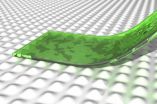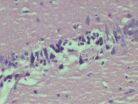(Press-News.org) Not even geckos and spiders can sit upside down forever. Nanophysics makes sure of that. Mechanics researchers at Linköping University have demonstrated this in an article just published in Physical Review E. Knowledge that can be of great industrial benefit.
Geckos and spiders that seem to be able to sit still forever, and walk around upside down have fascinated researchers worldwide for many years. We will soon be able to buy smart new fasteners that hold the same way as the gecko's foot. But the fact is, sooner or later the grip is lost, no matter how little force is acting on it. Stefan Lindström and Lars Johansson, researchers at the Division of Mechanics, Linköping University, together with Nils Karlsson, recent engineering graduate, have demonstrated this in an article just published in Physical Review E.
Still, it's a phenomenon that can have considerable benefits, for instance in the production of graphene. Graphene consists only of one layer of atom, and which must be easily detached from the substrate.
In his graduation project at the Division of Mechanics, Nils Karlsson studied both the mechanics of the gecko's leg as well as the adhesion of its foot to the substrate. The gecko's foot has five toes, all with transverse lamellae. A scanning electron microscope shows that these lamellae consist of a number of small hair-like setae, each with a little film at the end, which resembles a small spatula. These spatulae, roughly 10 nm thick, are what adheres to the substrate.
"At the nano level, conditions are a bit different. The movement of the molecules is negligible in our macroscopic world, but it's not in the nano world. Nils Karlsson's graduation project suggested that heat, and consequently the movement of the molecules, has an effect on the adhesion of these spatulae. We wanted to do further analyses, and calculate what actually happens," explains Stefan Lindström.
They refined the calculations, so they applied to a thin film in contact with an uneven surface. So, the film only contacts the uppermost parts of the uneven surface. The researchers also chose to limit the calculations to the type of weak forces that exist between all atoms and molecules – van der Waals forces.
"It's true, they are small, but they are always there and we know that they are extremely reliant on distance," says Lars Johansson.
This means that the force is much stronger where the film is very close to a single high point, than when it is quite close to a number of high points. Then, when the film detaches, it does this point by point. This is because both contact surfaces are moving – vibrating. These are tiny movements, but at some stage the movements are in sync, so the surfaces actually lose contact. Then the van der Waals force is so small that the film releases.
"So in reality, we can detach a thin film from the substrate simply by waiting for the right moment. This doesn't require a great deal of force. The part of the film that remains on the substrate vibrates constantly, and the harder I pull on this part, the faster the film will detach. But how long it takes for the film to detach also depends on the structure of the substrate and the film's stiffness," says Stefan Lindström.
In practice this means that even a small force over a long period will cause the film, or for that matter the gecko's foot, to lose its grip. Which is fine for the gecko, who can scoot off, but maybe not so good for a fastening system. Still – in the right application, this knowledge can be of great industrial benefit.
INFORMATION: END
Even geckos can lose their grip
2014-07-09
ELSE PRESS RELEASES FROM THIS DATE:
Frogs have developed rapid defences against the red swamp crayfish
2014-07-09
The common frog is one of the amphibians with the highest distribution in the Iberian Peninsula. It reproduces preferably in permanent areas of water where it comes into contact with the red swamp crayfish, which preys on its larvae. Research carried out by the Spaniard Germán Orizaola from the University of Uppsala (Sweden) confirms that the larvae of these frogs have developed a defensive response to the invasive species. They also have deeper tails and larger bodies if they co-exist with the crayfish.
Numerous invasive organisms are currently spreading outside of their ...
RUB chemists develop novel catalyst with 2 functions
2014-07-09
Chemists at the Ruhr-Universität Bochum have made a decisive step towards more cost-efficient regenerative fuel cells and rechargeable metal-air batteries. They developed a new type of catalyst on the basis of carbon, which can facilitate two opposite reactions: electrolysis of water and combustion of hydrogen with oxygen. A catalyst of this kind might make the storage of wind and solar energy and the manufacture of cost-efficient batteries, for example for electric cars, possible. The team published their report in the "International Edition" of the magazine "Angewandte ...
Rotten egg gas holds key to healthcare therapies
2014-07-09
It may smell of flatulence and have a reputation for being highly toxic, but when used in the right tiny dosage, hydrogen sulfide is now being being found to offer potential health benefits in a range of issues, from diabetes to stroke, heart attacks and dementia. A new compound (AP39), designed and made at the University of Exeter, could hold the key to future therapies, by targeting delivery of very small amounts of the substance to the right (or key) places inside cells.
Scientists in Exeter have already found that the compound protects mitochondria – the "powerhouse" ...
NIH launches Phase I clinical trial of novel drug to treat Clostridium difficile infection
2014-07-09
The National Institute of Allergy and Infectious Diseases (NIAID), part of the National Institutes of Health, has launched an early-stage clinical trial of CRS3123, an investigational oral antibiotic intended to treat Clostridium difficile (C. difficile) infection. CRS3123 (previously known as REP3123) is a narrow-spectrum agent that inhibits C. difficile growth while sparing normal intestinal bacteria.
The Phase I trial will enroll up to 30 healthy men and women ages 18 to 45 in a dose-escalation study to evaluate the investigational drug's safety and tolerability. Quintiles, ...
The impact of big data on health care: Health Affairs' July issue
2014-07-09
Big data can yield big savings, if they are used in the right ways. David W. Bates of the Brigham and Women's Hospital and coauthors analyzed six use cases with strong opportunities for cost savings—high-cost patients; readmissions; triage; decompensation (when a patient's condition worsens); adverse events; and treatment optimization when a disease affects multiple organ systems. They suspect that cost-savings benefits will vary widely, though the current costs associated with all six scenarios will be significant. The authors suggest that using analytics for multiple ...
Discovery of new drug targets for memory impairment in Alzheimer's disease
2014-07-09
VIDEO:
This is a movie showing how the reactive astrocytes in the brains of Alzheimer's disease model produce the inhibitory transmitter GABA by the enzyme MAO-B and release GABA through the...
Click here for more information.
Alzheimer's disease, which is the most common cause of dementia, is fatal and currently, there is no cure. In Alzheimer's disease, brain cells are damaged and destroyed, leading to devastating memory loss. It is reported that 1 in 8 Americans aged 65 or over ...
Neuroprotective effects of low concentration of lithium
2014-07-09
Lithium, as a neuroprotective agent, benefits for neuronal survival. Recent cDNA array studies have demonstrated that mood stabilizer lithium exhibits neuroprotective effects through multiple targets. Dr. Riadh Nciri and his team, Purpan Medicine Faculty, Paul Sabatier University, France, exposed SH-SY5Y cells to 0.5 mmol/L lithium carbonate for 25-50 weeks and then detected the expression levels of some neurobiology related genes and post-translational modifications of stress proteins in SH-SY5Y cells. cDNA arrays showed that pyruvate kinase 2 (PKM2) and calmodulin 3 expression ...
Filiform needle acupuncture versus antidepressant drugs for poststroke depression
2014-07-09
Whether acupuncture or antidepressant drugs exhibit better therapeutic effects on poststroke depression remains disputed. The effectiveness of acupuncture for poststroke depression can be evaluated by evidence-based medicine studies, which provide evidence for clinical application. Systematic review or meta-analysis studies have demonstrated that early acupuncture is superior to conventional western medicine in the treatment of poststroke depression. However, high-quality literatures are needed to further validate the effectiveness of acupuncture for poststroke depression. ...
What aggravates hippocampal neuronal injury in acute cerebral ischemia?
2014-07-09
Activation of extracellular signal-regulated kinase 1/2 has been demonstrated in acute cerebral ischemia. Yaning Zhao and her colleagues, Hebei United University, China induced transient whole-brain ischemia by four-vessel occlusion in normal and diabetic rats and intravenously injected diabetic rats with extracellular signal-regulated kinase 1/2 30 minutes before ischemia as a pretreatment. Results showed that during the pathological progression of cerebral ischemia/reperfusion in rats, activation of extracellular signal-regulated kinase 1/2 exhibits protective effect ...
Depression in AMD patients with low vision can be halved by integrated therapies
2014-07-09
SAN FRANCISCO – July 9, 2014 – The first clinical trial to examine integrated low vision and mental health treatment has shown that the approach can reduce the incidence of depression by half among people with low vision due to age-related macular degeneration (AMD). The results of the study were published online today in Ophthalmology, the journal of the American Academy of Ophthalmology.
Low vision is a visual impairment that interferes with a person's ability to perform everyday tasks and cannot be corrected with glasses, contact lenses, medicine or surgery. A common ...




